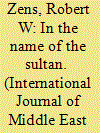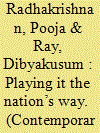|
|
|
Sort Order |
|
|
|
Items / Page
|
|
|
|
|
|
|
| Srl | Item |
| 1 |
ID:
112176


|
|
|
|
|
| Publication |
2012.
|
| Summary/Abstract |
This article examines the administration of Haci Mustafa Pasha, the military governor of Belgrade from 1793 to 1801. His appointment to this strategically located post was at odds with the contemporary trend in Ottoman provincial politics. Unlike most high-ranking provincial officials at this time, especially in the Balkans, Mustafa Pasha was not among the wealthy and militarily powerful ayan (local notables) but rather a career bureaucrat. His tumultuous and ultimately tragic administration reveals that his appointment was part of the attempt by Sultan Selim III (r. 1789-1807) to recentralize provincial governance. This study also provides a sociopolitical portrait of Belgrade and the surrounding region during the 18th century, as well as a brief look at the dangerous alliance of ayan and the janissaries.
|
|
|
|
|
|
|
|
|
|
|
|
|
|
|
|
| 2 |
ID:
096973


|
|
|
|
|
| Publication |
2010.
|
| Summary/Abstract |
AS YOU drive through the streets of Tripoli, Muammar el-Qaddafi, Libya's Brotherly Leader and Guide to the Revolution, beams down upon you. From huge billboards to kitschy key chains, the Leader, as Libyans call him, is everywhere. Indeed, for Libyans it is impossible to imagine life without him: Qaddafi took power over forty years ago and is now the world's longest-serving nonroyal ruler. In his prime, he championed a host of revolutionary causes and implemented what he declared to be an Islamic form of socialism mixed with Arab nationalism. Qaddafi even christened the term jamahiriya-"state of the masses"-to describe the Libyan system. Yet despite this mix of égalité and fraternité, Libya looks set to become, in practice, a hereditary monarchy with Qaddafi's son, Saif al-Islam, as the dauphin.
Although Libya is always a bit, shall we say, singular in its politics, in this monarchical shift it is not alone: the transformation of so-called republican regimes into monarchies is a depressing trend in the Arab world today. They call this jumlukiya, a mix of the words for republic (jumhuriya) and monarchy (malikiya).
|
|
|
|
|
|
|
|
|
|
|
|
|
|
|
|
| 3 |
ID:
137915


|
|
|
|
|
| Summary/Abstract |
The year 2014 saw four significant developments in Malaysia: the mishandling of the missing flight MH 370 jetliner; rejection of the use of the term ‘‘Allah’’ in a Malaylanguage Christian publication; an anti-sedition blitz; and the resignation of the Selangor chief minister. However, Malaysia managed its foreign and economic affairs reasonably well.
|
|
|
|
|
|
|
|
|
|
|
|
|
|
|
|
| 4 |
ID:
192858


|
|
|
|
|
| Summary/Abstract |
The generic popularity of Hindi sports films has been overwhelming in recent years. The article examines this genre of Hindi films through the thematic construction of the sports‘man’ and its evolutionary manifestation from a masculine figure symbolising India’s national unitarian ethos to a megalithic, tradition-backed, orthodox patriarchy post-2010s. It elaborates this seemingly linear transformation through decade based phases, starting from the social-emancipatory athletic phenomenon of the pre-globalisation era to the neoliberal Hindi sports films of the early millennial phase. The study then explores the slow dissolution of the ‘composite masculinity’ that considered the ethnic variegation of Indian nationalism, and the emergence of sporting cinema on patriarchal and athletic superheroes. The article further discusses how it was nurtured within deeply insular, and ethno-religious gaming traditions of antiquity like the akhara wrestling, in fictional/biographical sports films like Sultan (Zafar 2016) and Dangal (Tiwari 2016). While commenting on this transformation of the ‘national athlete’ into the ‘heritage’s surrogate’, the article attempts to provide a detailed methodology of understanding the expanding canon of Hindi sports films so far and how it aligns itself with the re-ethnicisation of India’s polity in the last two decades.
|
|
|
|
|
|
|
|
|
|
|
|
|
|
|
|
| 5 |
ID:
149088


|
|
|
|
|
| Summary/Abstract |
From the fourteenth century CE onwards, South Indian states ruled by Hindu kings were strongly influenced by politico-cultural conventions from Muslim-governed areas. This development was, for instance, manifest in the dress and titles of the rulers of the Vijayanagara empire. As has been argued, they bore the title of sultan and on public occasions they appeared in garments fashioned on Persian and Arab clothing. Both adaptations exemplified efforts to connect to the dominant Indo-Islamic world. From Vijayanagara's fragmentation in the sixteenth and seventeenth centuries, new Hindu-ruled kingdoms arose. We may wonder to what extent those succeeding polities continued practices adopted from Islamic courts. With that question in mind, this article discusses royal dress at court audiences in four Vijayanagara successor states, chiefly on the basis of embassy reports of the Dutch East India Company and South Indian works of art. It appears that kings could wear a variety of clothing styles at audiences and that influences on these styles now came from multiple backgrounds, comprising diverse Islamic and other elements. Further, not all successor states followed the same dress codes, as their dynasties modified earlier conventions in different ways, depending on varying political developments.
|
|
|
|
|
|
|
|
|
|
|
|
|
|
|
|
|
|
|
|
|